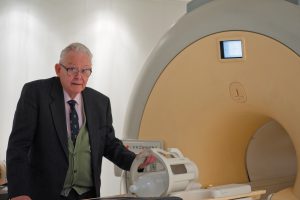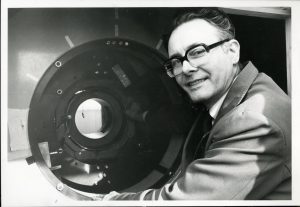March 1, 2017, by pressoffice
Remembering Sir Peter Mansfield’s generosity
Today (1 March) marks the funeral of Sir Peter Mansfield FRS, a pioneer in the creation of Magnetic Resonance Imaging (MRI). In this special blog David Walker, Professor of Paediatric Oncology at The University of Nottingham and Co-Director of the Children’s Brain Tumour Research Centre (CBTRC) recalls the time Sir Peter made a donation for the centre’s fundraising appeal.
Sir Peter Mansfield revolutionised clinical neuroscience worldwide with his remarkable discovery of magnetic resonance imaging, which for the first time permitted non invasive detailed analysis of the body’s structure and function, justifying his Nobel prize.
Shortly after receiving his Nobel Prize (2003) he visited my office to discuss the work we were doing to promote research into childhood brain tumours. He sat down beside my desk in his mackintosh and said that he thought we were doing important work for children.
He appreciated the challenge of sustaining research funding, particularly in generating new ideas and bridging grant funds, and passed a cheque to me to help.
There are not many times that someone offers you £50,000 to help your cause but this was one of them, to receive it from a world pioneer of science was an immense privilege which I will never forget.
Sir Peter and Lady Jean have been sustained supporters of the children cancer service at Queen’s Medical Centre over many years. Sir Peter’s achievement in science have added immeasurably to the technical advancement of childhood cancer management. His personal sustained interest and support has helped so many children, inspired researchers and clinicians and placed Nottingham at the forefront of thinking in the application of modern imaging methods in children’s neuroscience in particular.
All at the Children’s Brain Tumour Research Centre feel privileged to have known Sir Peter and to have used the product of his research effort to promote optimised patient care and development of new understanding through our own research.
We extend our sympathies to Lady Jean and the family at this sad time and share wholeheartedly in the celebration of a remarkable scientist’s life who has helped so many people through his scientific work.
This year CBTRC celebrates its 20th anniversary and The University of N ottingham’s annual fundraising campaign Life Cycle will focus on raising more money for research into the deadly form of cancer. A £500,000 appeal, which includes events such as a superhero stroll in October, has been launched to help raise funds.
ottingham’s annual fundraising campaign Life Cycle will focus on raising more money for research into the deadly form of cancer. A £500,000 appeal, which includes events such as a superhero stroll in October, has been launched to help raise funds.
No comments yet, fill out a comment to be the first



Leave a Reply